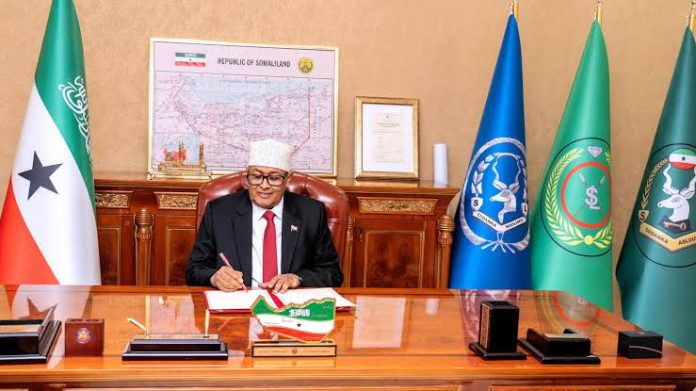Facebook Twitter (X) Instagram Somali Magazine - People's Magazine
Somaliland, a self-governing region in the Horn of Africa, has renewed its efforts for international recognition by offering the United States a strategic military base in the port city of Berbera, a move that could reshape regional dynamics. Despite declaring independence from Somalia in 1991, Somaliland remains unrecognized internationally, yet it has maintained relative stability and a functional government compared to Somalia.
The diplomatic spotlight on Somaliland intensified after the recent inauguration of its new president, Abdirahman Mohamed Abdullahi. The event saw an unusual gesture of support from the United States, as Ambassador to Somalia Richard Riley attended and praised Somaliland as “one of the best examples of democracy in action in Africa.” This high-level diplomatic engagement coincided with the introduction of a bill by Republican Congressman Scott Perry to recognize Somaliland as a sovereign state, a move previously attempted but rejected in the U.S. Congress. However, shifting geopolitical interests, including Somaliland’s willingness to host a U.S. military base, could alter the outcome this time.
Berbera, located near the Bab el-Mandeb Strait, is a critical shipping route connecting the Red Sea and the Indian Ocean. This strategic position significantly enhances Somaliland’s value for U.S. military and intelligence operations, especially for monitoring arms trafficking, Houthi activities in Yemen, and Chinese expansion in neighboring Djibouti. The offer comes amid rising tensions in the region, with Somaliland seeking stronger partnerships to bolster its case for sovereignty.
Somaliland’s strategic maneuvers extend beyond the U.S. In January, former President Muse Bihi Abdi signed a memorandum of understanding with Ethiopia, offering the landlocked nation sea access through Somaliland’s coastline in exchange for future recognition. This deal sparked tensions with Somalia, which labeled the agreement an act of “aggression” and recalled its ambassador from Addis Ababa.
Further complicating matters, Somaliland has also developed diplomatic ties with Taiwan, which drew China’s ire. Taipei’s Deputy Foreign Minister François Chihchung Wu attended President Abdullahi’s inauguration, signaling continued collaboration despite Beijing’s firm support of Somalia’s territorial claims. China’s alignment with Mogadishu and its broader interests in Africa could push the U.S. to reassess its stance on Somaliland, particularly as U.S.-China tensions rise.
Adding a layer of political complexity, Somaliland’s bid for recognition aligns with the controversial “Project 2025,” a policy agenda backed by the conservative Heritage Foundation. The plan, reportedly supported by former aides of Donald Trump, includes the recognition of Somaliland as part of a broader strategy to counter China’s growing influence in Djibouti. If Trump returns to office, Somaliland’s recognition could gain serious traction.
However, the path forward is fraught with challenges. Key U.S. allies in the region, such as Egypt and Turkey, hold opposing views on Somaliland’s sovereignty. Egypt, which has aligned closely with Somalia and has ongoing disputes with Ethiopia over Nile River water rights, could perceive U.S. recognition of Somaliland as a direct affront to its interests. Meanwhile, Turkey, a NATO ally, has deepened its ties with Somalia through defense and energy agreements, positioning itself as a key player in the region.
The African Union (AU) remains another critical hurdle. Historically opposed to secessionist movements, the AU fears that recognizing Somaliland could set a dangerous precedent, encouraging separatist movements across the continent. Somalia remains a vital U.S. partner in the fight against extremist groups like al-Shabaab and the Islamic State, further complicating the issue.
The UAE also plays a significant role in the region’s geopolitics. Abu Dhabi has invested heavily in Africa, with over $59.4 billion spent on infrastructure projects in the past decade, including ports and military installations in Somaliland and Puntland. The UAE previously developed military facilities in Eritrea and Somaliland during its involvement in the Yemen conflict, raising concerns in Mogadishu over Emirati intentions.
During the Cold War, the Horn of Africa served as a proxy battleground between the U.S. and the Soviet Union. Now, as Somaliland trades the prospect of sovereignty for strategic alliances, it risks igniting a similar power struggle, with regional and global powers jockeying for influence. The fragile peace in the Horn of Africa, already one of the world’s most impoverished regions, could face further destabilization if these tensions escalate.
As Somaliland continues its bid for formal recognition, the balance between diplomacy and regional stability remains delicate. Whether its strategic offering of a U.S. military base will lead to sovereignty or further tensions in the Horn of Africa remains to be seen.

